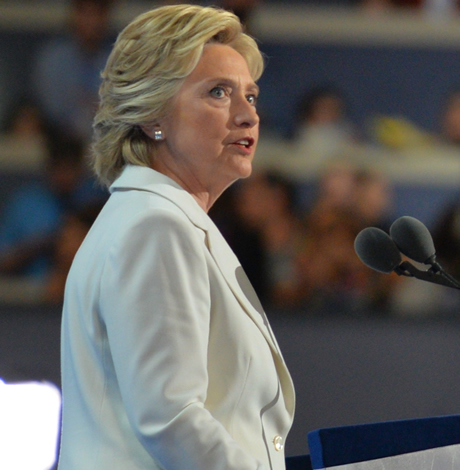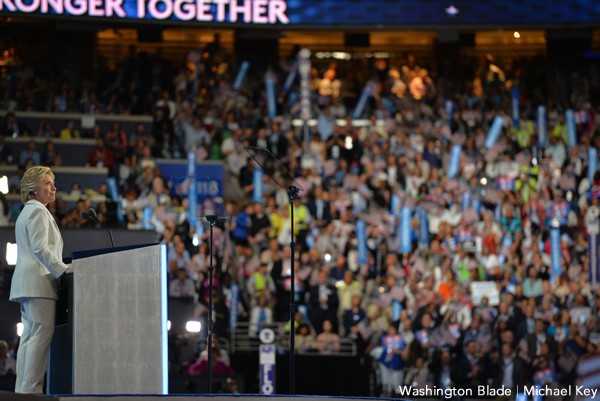Opinions
Will Clinton garner lowest share of gay votes ever?
LGBT voters reflect public’s dissatisfaction with major party candidates


Democratic presidential candidate Hillary Clinton (Washington Blade photo by Michael Key)
We’re entering the final throes of a national election enthusing few.
Dominated by dramatic campaign surprises, there are likely more to come. In this topsy-turvy unconventional election, one such possibility stands stark.
Win or lose, Hillary Clinton may garner the lowest share of LGBT votes in modern history.
Democrats appear keenly aware of this potential outcome. In an interview on the closing night of the Democratic convention, U.S. Sen. Cory Booker expressed alarm at indications of a lower level of support for Clinton among gays than is typical for a Democratic nominee. Booker, who had been a leading vice-presidential contender, characterized the lack of robust enthusiasm for Clinton among LGBT voters and a perceived rise in support for Donald Trump as “terrifying.”
According to exit polls by Gallup, Greenberg Quinlan Rosner Research and other survey firms, one-in-four-or-more LGBT voters have for two decades consistently cast ballots for Republican nominees, while one-third supported GOP Senate and House candidates in the most recent mid-term election.
Although polling is sporadic and limited due the tiny electoral cohort LGBT voters comprise, Trump has polled among gay voters at levels matching Romney in 2012 and McCain in 2008.
Although this election is notable for having become a vomit-inducing roller-coaster ride, Trump has polled near or at this standard historical level among LGBT voters in recent months, particularly in the wake of the attack at Pulse nightclub in Orlando. Clinton’s support, however, has registered significantly below previous Democratic candidates. In Reuters/Ipsos surveys, it dropped below 60 percent throughout July.
Similar to all Americans, one-quarter of LGBT voters indicate they don’t support either major party nominee. The high degree of dissatisfaction with both of these notorious grifters has the net effect of lowering Clinton’s tally of LGBT votes.
An astounding 41 percent of Americans have recently said they are having difficulty choosing between Clinton and Trump because they believe neither would make a good president. LGBT voters are undoubtedly among them.
When given the option, 13 percent told a polling firm aligned with Democrats they’d prefer a giant meteor hitting earth than being forced to chose either Clinton or Trump. The disaffected among those under 30 represents a plurality. With the largest bloc of voters now self-identifying as independents, more than a quarter of the unaffiliated would chose annihilation.
Although huge super-majorities consider Clinton untrustworthy and dishonest, and fully two-thirds say the country is headed in the wrong direction, the renegade yet equally distrusted Trump has managed to make an establishment-aligned career politician the more sympathetic candidate despite voters otherwise clamoring for change.
The legalization of same-sex marriage and the resulting or inevitable civil protections that conveys, alongside other equality victories, portends LGBT voters evolving to a less predictable single-issue voting bloc. As cultural integration broadens, LGBT voting patterns are expected to gradually transform over mainstream issues.
It may be that Trump will do no better and may do worse among LGBT voters than is common for Republican presidential candidates. Nothing is certain in this certainly weird election and Trump continuing to exhibit erratic campaign behavior could be his demise.
In the end, though, whether Trump under or over performs among LGBT voters may have little effect on the vote share Clinton wins.
If LGBT voters in the vast majority of pre-determined “blue” and “red” states cast their ballot for a minor party candidate knowing it would not affect the outcome, gay vote shares for both Clinton and Trump would diminish. Voters in New York, for example, view Clinton with more disdain than any statewide Democratic candidate in more than a century.
With both candidates languishing in the gutter on favorability, the prospect of lessened LGBT balloting for them, and especially Clinton, looms large.
Whether 2016 represents the advent or the delay of LGBT realignment borne of assimilation, and whether Clinton’s unpopularity suppresses her LGBT vote share, may be the biggest takeaways for the gay community.
Mark Lee is a long-time entrepreneur and community business advocate. Follow on Twitter: @MarkLeeDC. Reach him at [email protected].
Opinions
Vote Democratic or July 4, 2025 will look very different
Biden’s debate performance was bad but the sky is not falling

As we celebrate the founding of our country, we must recognize the election on Nov. 5 could dramatically change how our country looks in the future. We can debate whether Joe Biden is the best candidate for Democrats on the ticket, but reality is, whoever the Democratic candidate is, they must defeat Donald Trump. Trump is a racist, sexist, misogynistic, homophobic pig who was found liable for sexual assault and convicted of 34 felonies. A man who spouts lies every time he opens his mouth. A man who uses Hitler’s words, and said he will be a dictator on his first day in office. A man who said he will seek retribution on any opponent, using the Department of Justice and IRS to do his dirty work.
Yes, President Joe Biden had a disastrous debate, and many pundits are calling for him to step down as the candidate. They are having a field day doing so, because none of them are involved in the process that would follow. None of them mention the two times in recent history, Democratic presidents chose to not run for a second term, Lyndon Johnson and Harry Truman, a Republican won. This time the Republican alternative is the disgusting, evil, Donald Trump. Even the New York Times editorial board, when calling for Biden to step aside as a candidate, wrote, “If the race comes down to a choice between Mr. Trump and Mr. Biden, the sitting president would be this board’s unequivocal pick. That is how much of a danger Mr. Trump poses.”
The simple truth is Biden feels he can win, and won’t step aside. The only person who could convince him to do so, is his wife, Jill Biden, and she has shown she will not do that. She reminds me a little of Nancy Reagan, who protected her husband when he had issues with cognition.
What all Americans need to understand, is no American president makes decisions on their own, without massive consultation with advisers. They don’t meet foreign dignitaries alone, but with advisers. And President Biden has shown he has the most incredible group of advisers around him, maybe with the exception of those who prepared him for this debate.
I have loads of questions for them. If President Biden had a cold as claimed, why didn’t they tell him to begin his first statement of the debate with an apology to the audience. Something like, “I want to take a moment to apologize to the TV audience on how my voice is today, and how it will sound to you. I have a severe cold and will sound raspier, and slower, but of course feeling a little ill would not keep me from being here today.” It could have changed the tenor of the debate. It would not have excused his poor performance, but may have given people a few thoughts in his favor. Then there was the closing two minutes. How is it possible the president wasn’t coached on ending the debate with the issues he has said he believes will win for Democrats: abortion, climate change, and saving democracy? The debate prep team kept him cloistered for a week; seems they could be sued for malpractice.
Again, it was a disastrous debate for President Biden. But then rather than what the pundits are saying, grassroots Democrats are responding with money. The Biden campaign reported Saturday that it raised $27 million on Thursday and Friday. The hour after the debate ended was its best grassroots fundraising hour since Biden kicked off his reelection campaign, per the Hill.
So contrary to the all the pundits, the sky is not falling. Yes, there is a lot more work to do than before the debate. But the focus for all Democrats, and all decent people, must be to ensure we don’t reelect Trump, because of what he would do to our country. How his election would change us. How if he did what he says, and tries to return all decisions on just about everything, to the states, it is not only women who must be scared. It is Blacks, the LGBTQ+ community, every minority; and young people who will live longest with the results of doing nothing to ameliorate climate change. They should all be very scared.
So happy 4th and here’s to hoping Americans are smart enough to vote correctly, and ensure July 4, 2025 will be just as happy.
Peter Rosenstein is a longtime LGBTQ rights and Democratic Party activist. He writes regularly for the Blade.

Joe Biden was clearly ready with some facts for this debate, the sad part is he couldn’t articulate them. He sounded raspy, and lost track of what he was saying in the first few minutes of the debate. He did get better as the debate progressed but came off sounding and looking like an old man. For those of us hoping he would sound like he did at the State of the Union, or the speech he gave on anti-Semitism, it was a huge disappointment.
So, where his campaign goes from here is anyone’s guess. Behind the scenes some Democrats are calling for him to step down as the candidate. But that is much more difficult than it seems at this time. And then, will there be a fight for who the candidate will be. Will it automatically be Kamala Harris, or will it be someone else? So many unanswered questions over the next couple of weeks.
The only positive take-away for Democrats from the debate was how deranged Donald Trump sounded. He refused to deal with any issue, refused to say he would accept the results of this election, refused to acknowledge climate change, or Jan. 6, and kept saying how the states should control the issue of abortion, and women’s health. Every one of these things should be frightening to so many people. It is clear if Trump is elected, we will have a dictator in the White House, who believes Hitler did good things. His election is scary for women, young people, Black Americans, and the LGBTQ community. If states control issues related to any of these groups, they are screwed.
One of the very few good lines Biden got across was when he said 40 high-level Trump appointees, members of the Cabinet, and his vice president, have refused to endorse him as they know him best. People need to take their word for how bad he will be should he be reelected. Trump kept talking nonsense and it was hard to keep up with the lies. The moderators didn’t call him on any of it, but CNN has said before the debate they wouldn’t. But then Biden missed so many chances to call him on the garbage he was spouting. I kept hoping he would turn to him and say clearly, “You can’t believe all the BS you are spouting. You sound like a deranged six-year-old and someone who would take our country down the tubes.”
Now I accept the fact Biden speaks more slowly and softly. Though after the debate they said he had a cold. He could have said that at the beginning of the debate, if it was true, and explained his voice to the audience. And while we know he has a stutter, it seemed so much worse during the debate than it normally does. Was it nerves, maybe, but difficult nonetheless for him, and for those listening. We must have compassion for anyone with any kind of a disability. Then one had to ask, was he over-prepared for this debate? Was he so scripted he didn’t dare say anything off script. When he did, they got into this thing about golf handicaps and both sounded so childish.
Biden did manage to talk about the things he has done, and the successes of his first administration. There have been many. First bringing the country successfully out of the pandemic. He spoke about unemployment being the lowest it has been in decades, and the more than 15 million jobs created since he took office. He was honest about inflation and the fact that not all the economic successes the country is having are trickling down to every American. He understands that rents are high, and grocery bills are still too high. He made clear he wants to raise taxes on the rich and Trump wants to lower them. He had a plan to ensure Social Security would stay solvent, Trump had nothing as usual.
Finally, I was surprised that in his two-minute closing, Biden didn’t go back to the issues of abortion, climate change, and saving democracy. Did his debate prep team tell him not to? If so, they were wrong. Whether it remains Joe Biden on the ticket, or is someone else, I am 1,000% committed to do everything I can to see Democrats are elected across the board. It is clear to me, and should be to all decent people, electing Donald Trump and his MAGA Republicans, will be the end of our country as we know it today.
Peter Rosenstein is a longtime LGBTQ rights and Democratic Party activist. He writes regularly for the Blade.
Opinions
As fewer anti-LGBTQ bills pass, the fight gets harder
A growing indifference to suffering that is baked into the legal system

In recent years, advocates have faced an unprecedented avalanche of anti-LGBTQ legislation each spring. In 2024, however, the onslaught seems to have faltered somewhat. While hundreds of anti-LGBTQ bills were once again introduced, as many state legislative sessions draw to a close, fewer bills have been enacted into law.
While that may seem like cause for celebration, it’s also cause for concern.
To be sure, the slowdown in anti-LGBTQ legislation is welcome. Beginning in 2020, legislation targeting transgender rights in particular had sailed through state legislatures, with the number and scope of hostile bills increasing each year. Unlike earlier years when one or two prominent anti-LGBTQ bills triggered a national pushback that often chastened lawmakers, hundreds of bills have been introduced during legislative sessions in the last four years, often with little debate or scrutiny, and dozens of them zealously passed into law.
Those bills do real damage when they are enacted, cutting LGBTQ people off from material benefits like health care and domestic violence shelters, recognition by the state, and equal participation in public life. Even when they fail to become law, they have devastating effects on the mental health of LGBTQ people, throwing their lives into disarray and sapping valuable time and energy from LGBTQ communities. This especially affects children, with more than 90 percent of LGBTQ young people in a recent Trevor Project survey reporting that politics had negatively affected their personal well-being.
But the recent slowdown, far from being a positive signal, may well reflect a growing indifference to the suffering of LGBTQ people that is now baked into the political and legal system. Opponents of LGBTQ rights have normalized hostile rhetoric and enacted draconian laws that seemed unthinkable just a couple of years ago, and even ardent supporters of equality find themselves unsure how they might reverse state laws that unapologetically strip away LGBTQ rights.
If anything, it has become apparent that the damage that has been done since 2020 will most likely reverberate for a generation, and the past year shows that restoring and advancing LGBTQ rights will be a painstaking endeavor.
And one sobering reason for the slowing pace of anti-LGBTQ legislation is that, at this point, many conservative states have already stripped away important rights, particularly for transgender children. As of 2024, half of the states in the U.S. prohibit transgender girls from playing school sports, and half have banned or criminalized at least some forms of medically indicated healthcare.
Put differently, lawmakers aren’t targeting some rights this year because they’ve already eviscerated them.
Yet even as the pace of legislation slows, critical rights continue to be stripped away. According to the ACLU, more than 30 anti-LGBTQ bills have been enacted in 2024 — fewer than the 84 enacted in 2023, but still far too many. Among them, Utah and Mississippi restricted transgender people from accessing bathrooms and locker rooms in public schools and other government buildings.
Lawmakers in Ohio overrode the governor’s veto to ban transgender children from receiving gender-affirming care or playing sports consistent with their gender identity. South Carolina and Wyoming similarly enacted blanket bans preventing transgender children from accessing gender-affirming care.
Many of the bills that have been introduced this year sought to expand existing anti-LGBTQ legislation in new ways. Alabama, for example, successfully expanded its bathroom ban from K-12 schools to colleges and universities. Even those that didn’t pass are in many cases likely to be reintroduced after the 2024 election, particularly if anti-LGBTQ lawmakers increase their showing in state legislatures or if governors who are supportive of LGBTQ rights are no longer positioned to veto hostile legislation.
In many states with anti-LGBTQ legislation, administrative and regulatory agencies are being used to curtail LGBTQ rights even further. Florida offers an instructive example. Even after years of anti-LGBTQ legislation, the Florida Department of Highway Safety and Motor Vehicles took things a step further within its mandate, and decided in 2024 that transgender people could no longer update the gender marker on their driver’s licenses. This echoes recent regulatory crackdowns elsewhere in the United States, from the Texas Department of Family and Protective Services investigating parental support for transgender children as child abuse to school boards across the country stripping away lifesaving resources in schools.
And while many believed that courts would provide a bulwark against discriminatory legislation and regulations, in part because of strong Supreme Court precedent to suggest that anti-transgender discrimination is a form of sex discrimination, that has not consistently been the case. Trial courts have largely found in favor of transgender litigants, criticizing the insufficient justification and discriminatory purpose of anti-transgender laws, but some appellate courts have nevertheless allowed the laws to take effect.
Perhaps most alarming, there are advocates and lawmakers who, if in a position to do so, are eager to carry out an even harsher attack on LGBTQ rights. Project 2025, which a group of conservative organizations has drafted as a roadmap for a second Trump administration, promises an even more draconian attack on LGBTQ rights. This would include rolling back existing nondiscrimination protections for LGBTQ people, reinstating the transgender military ban, and codifying state restrictions on transgender rights at the federal level, in addition to limiting recognition of same-sex relationships.
The anti-LGBTQ backlash may be waning in certain respects — but in other ways, it has only just begun. As we celebrate Pride, LGBTQ people and their allies should be mindful of the need to support those communities whose rights are being eroded, invest in transgender rights organizing, demand that lawmakers prioritize LGBTQ rights, and fight for the independent institutions and protections for basic freedoms that are essential to hold power to account.
Ryan Thoreson is a specialist on LGBTQ rights at Human Rights Watch and teaches at the University of Cincinnati College of Law.
-

 Canada2 days ago
Canada2 days agoToronto Pride parade cancelled after pro-Palestinian protesters disrupt it
-

 Baltimore4 days ago
Baltimore4 days agoDespite record crowds, Baltimore Pride’s LGBTQ critics say organizers dropped the ball
-

 Sports4 days ago
Sports4 days agoHaters troll official Olympics Instagram for celebrating gay athlete and boyfriend
-

 U.S. Supreme Court1 day ago
U.S. Supreme Court1 day agoConcern over marriage equality in US grows two decades after first Mass. same-sex weddings










